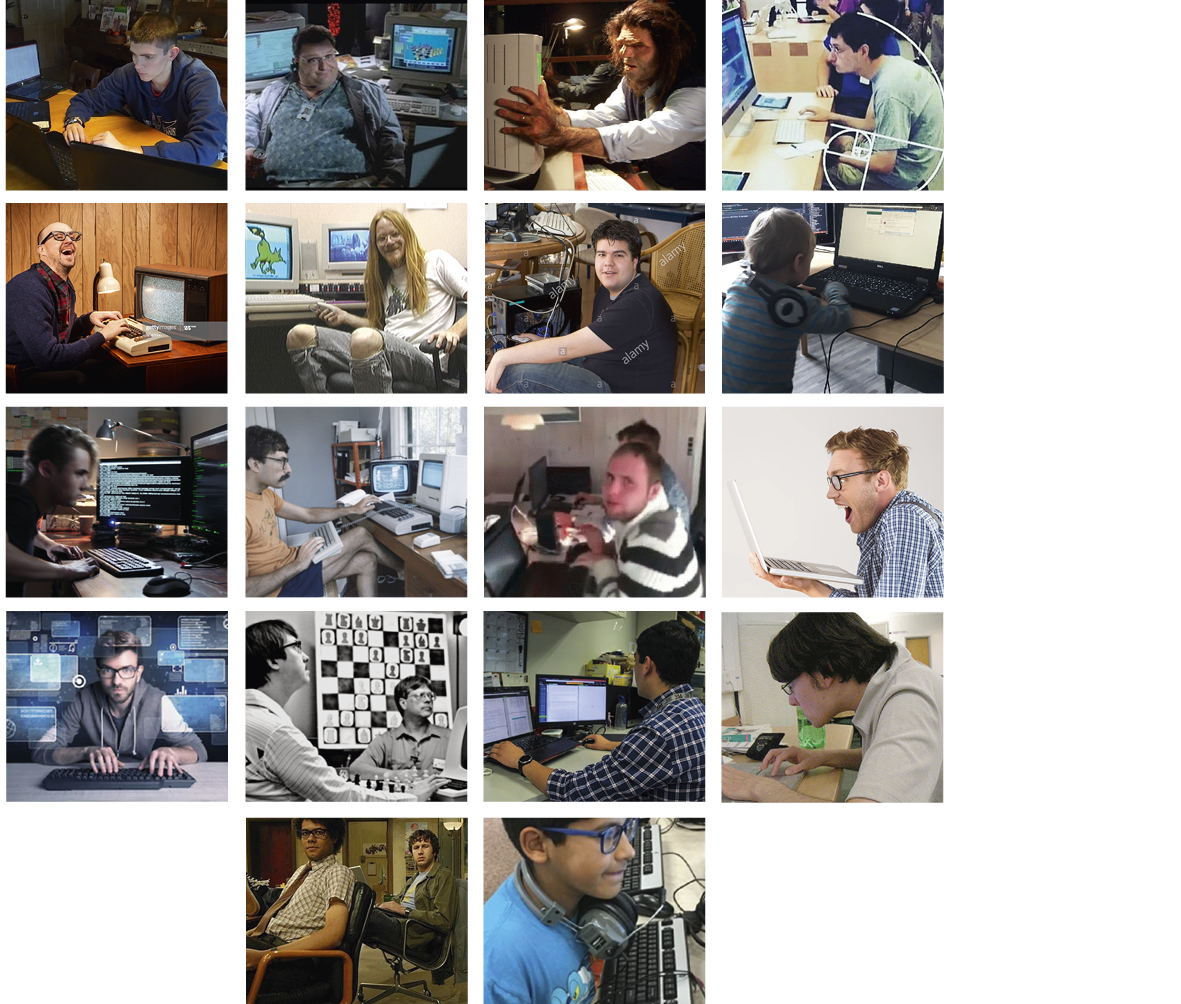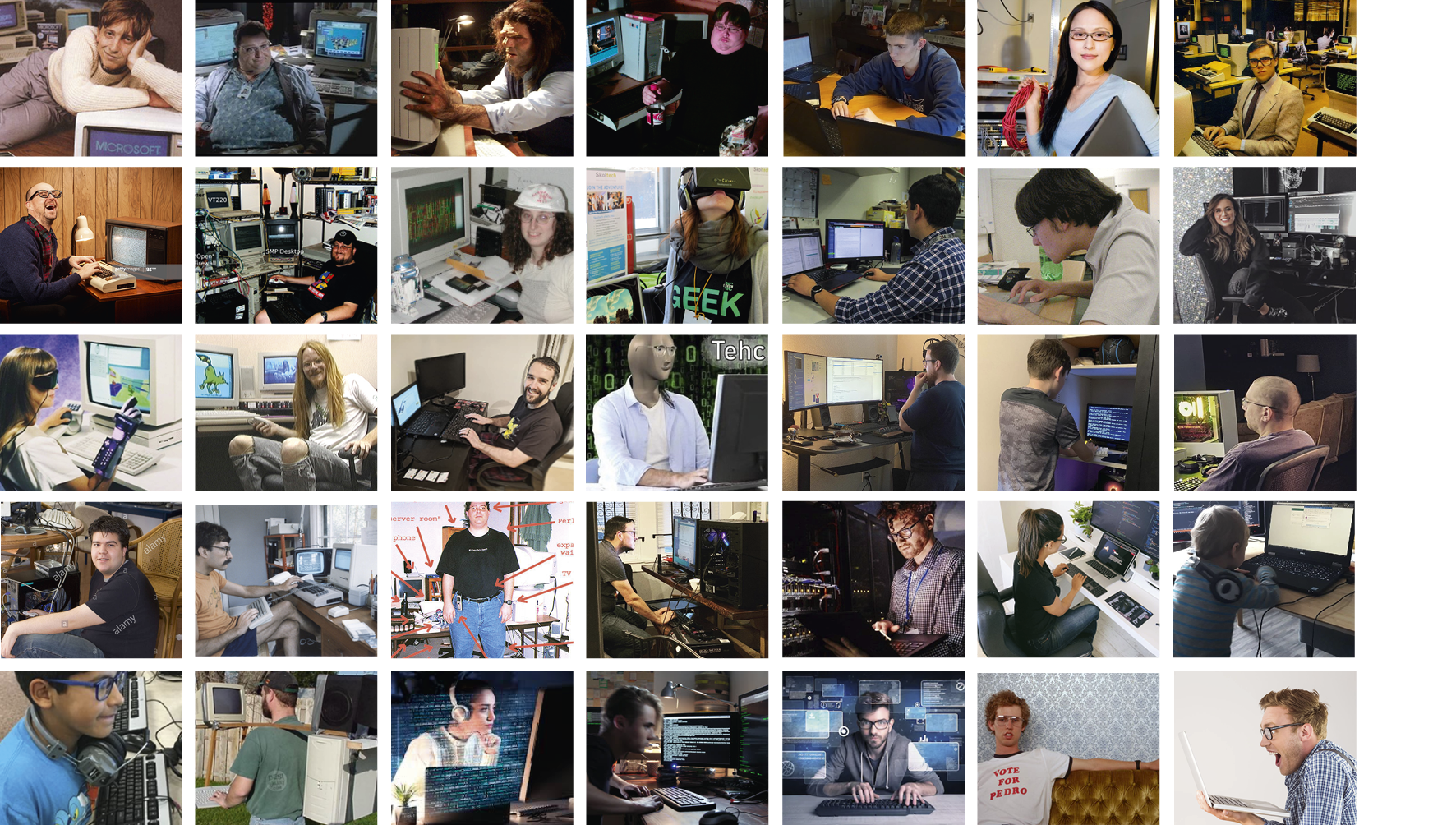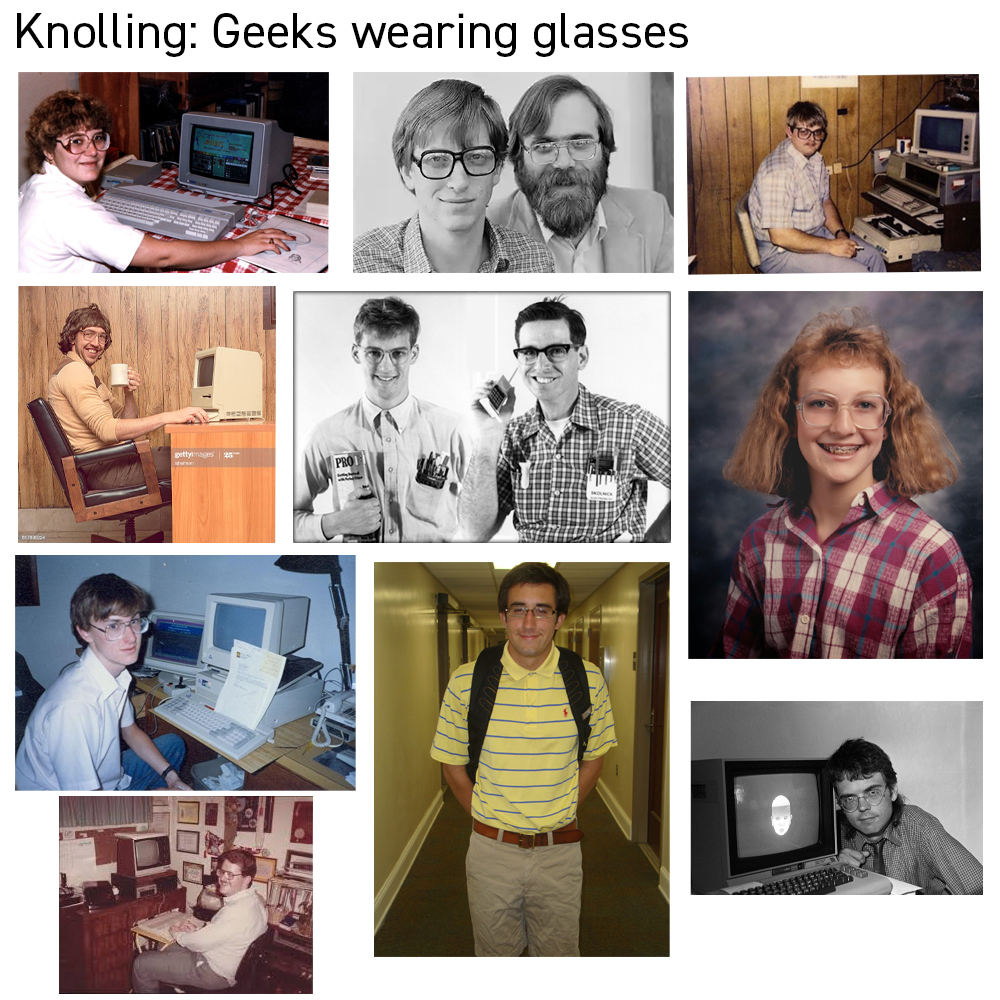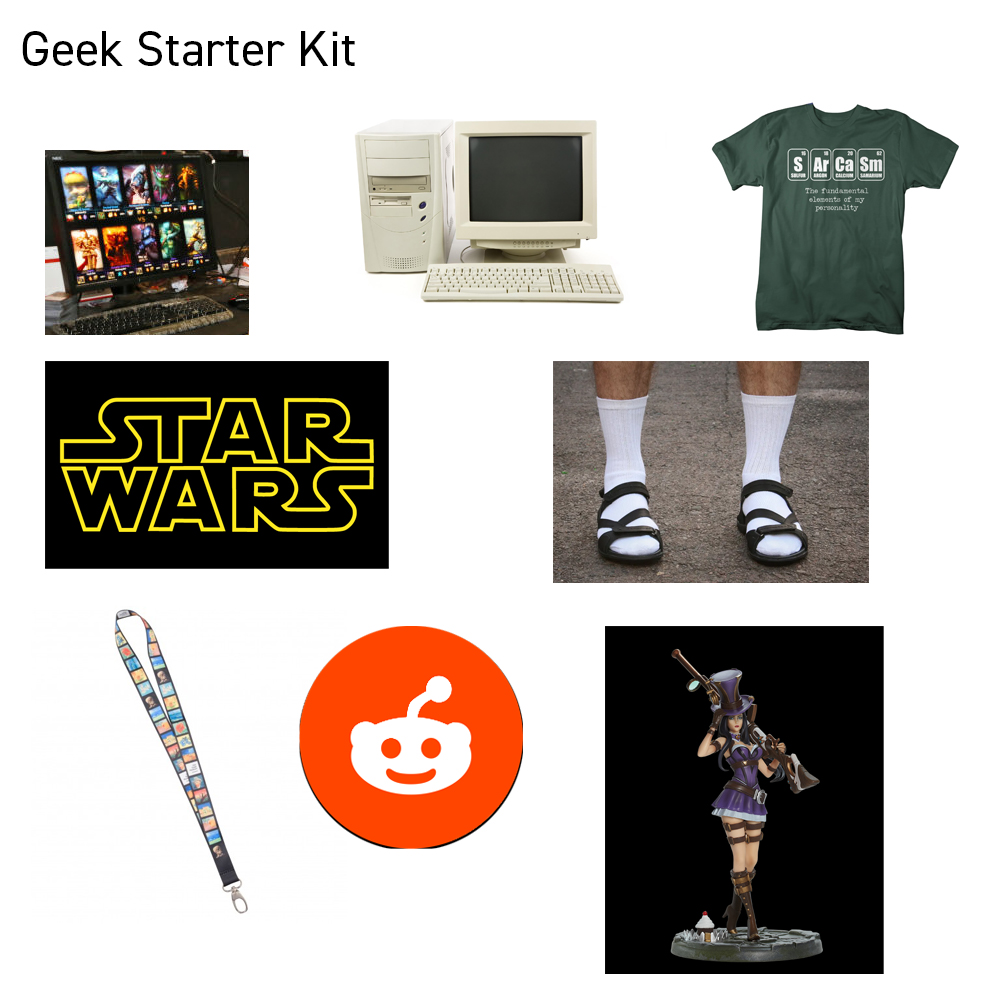Home
Group Representation
50 images Baris
50 images Noa
50 images Emme
>
>
>
Knolling Baris
Knolling Noa
Knolling Emme
The social group that we will be focussing on are computer geeks.
In computers and the Internet, a geek is a person who is inordinately dedicated to and involved with technology. ... Over time, the meaning of geek has changed to include anyone with an obsession that places him outside mainstream society.
T-SHIRTS [clothing]
Bad posture [from sitting behind computer]
Acting introvert [alone]


1. “Everyone creates stereotypes. We cannot function in the world without them.” (S. Gilman)
1.1 Write down your interest in this group? What are you curious about? How do you relate to this group (positive or negative); do you want to be part of it, do you admire them, are you more negative about them?
I find this group very interesting because they stick out positively by having a big passion for something. I'm curious to learn more about why they find computers so fascinating and what made them gain interest.
Personally, I would not like to be a part of this group because their interests are different from mine, even though I use a computer a lot, I am not fascinated by it. I do admire them because they are usually not afraid to be different.
1.2 What are the assumptions you have (or had) about the ‘social group’? Where did you get these from? How were they debunked or confirmed?
The assumptions I had about this group is that they are very smart. They look smart because of their glasses and they know a lot about technology. Just because you wear glasses and are smart with computers does not make you>
overal smart and all-knowing, I discoverd this when talking too people from the social group. I also thought most computer geeks were introvert, however I found out through a study that over half of computer geeks are introverted, so not all of them are.
2. Signifiers that stereotype: Objects and their meaning
2.1 Which existing stereotypes have you found about your group?
Smart, badly dressed, bad posture, un-manly, male, bad haircut, not good with women, shy, annoyed, busy.
2.2 Fragmentation and Fetishized: Which objects (e.g. food, products, clothes, part of the body) are used to stereotype with?
Glasses, technology, junk food, graphic tees, hoodies, slouched back
2.3 Where did you find them? In which shape, form, or media (jokes, sayings, news, tv, politics, shops, education,…)
In TV shows you find this everywhere starting from kids>
TV to adult TV, think of: Steve Urkel - "Family Matters", Sheldon Cooper and Leonard Hofstadter - "The Big Bang Theory", Cookie - "Ned's Survival Guide", Freddy - "iCarly", Dwight Schrute - "The Office", Milhouse van Houten - "The Simpsons", Chuck Bartowski - "Chuck".
3. The effect of stereotypes: Power and discrimination
3.1 Who spreads these stereotypes? What’s their intention?
People in the media spread this stereotype so that they have a type to laugh at. Because these people stick out it seems to be fun to watch them do things differently/struggle.
3.2 Did you find examples of discrimination, ongoing conflicts, historic events, or other injustices where stereotypes are used to control or overpower your‘ social group’? Describe/show what happened?
https://www.telegraph.co.uk/news/2019/12/17/nerd-geek-insults-should-classed-hate-crimes-academic-claims/ Often geeks are bullied for having a high IQ, this should be classed a hate-crime according to the Telegraph.>
https://www.theguardian.com/science/brain-flapping/2014/sep/11/brutal-oppression-nerds-geeks-david-harding-n-word
3.3 Have you found examples where your ‘social group’ is reversing the stereotype; using the known stereotypes and appropriating them for their cause? (see more Hall, 5.1: Reversing the stereotype).
Questions: "type" "stereotype"
Stereotype
Type
-Past, explaining computer geeks to the past, 1950 [Emme]
-Present, explaining computer geeks to the present, 2020 [Baris]
-Future, explaining computer geeks to the future, 2050 [Noa]
LEVELS


1. “Everyone creates stereotypes. We cannot function in the world without them.” (S. Gilman)
1a.Write down your personal interest in this group? What are you curious about? How do you relate to this group (positive of negative); do you want to be part of it, do you admire them, are you more negative about them?
My personal interest in the social group, the Geeks is that I relate with them. I feel as though if I was born 40 years ago, I would be one of them. I find the fact that this group’s existence is also defined by the age they lived during pretty interesting. I feel very positive about Geeks, I share several interests with them too.
1b. What are the assumptions you have (or had) about the ‘social group’? Where did you get these from? How were they debunked or confirmed?
Many of my assumptions about geeks come from pop culture and knowledge that I have accrued over my lifetime.
2. Signifiers that stereotype: Objects and their meaning
2a. Which existing stereotypes have you found about your group? Describe them:
Smart, badly dressed, bad posture, un-manly, male, bad haircut, not good with women, shy, annoyed, busy, good with technology, introverted.
Fragmentation and Fetishized: Which objects (e.g. food, products, clothes, part of the body) are used to stereotype with?
Upper body, face, glasses, computers, posture, pens and pencils and braces.
Questions: "Type" "Stereotype"
2b. Fragmentation and Fetishized: Which objects (e.g. food, products, clothes, part of the body) are used to stereotype with?
Upper body, face, glasses, computers, posture, pens and pencils and braces.
2c. Where did you find them? In which shape, form or media (jokes, sayings, news, tv, politics, shops, education,…)
Geeks can most easily be found in television shows: "Family Matters", Sheldon Cooper and Leonard Hofstadter - "The Big Bang Theory", Cookie - "Ned's Survival Guide", Freddy - "iCarly", Dwight Schrute - "The Office", Milhouse van Houten - "The Simpsons", Chuck Bartowski - "Chuck".
3. The effect of stereotypes: Power and discrimination
3a. Who spreads these stereotypes? What’s their intention?
We all spread stereotypes, but it would mostly have to be television shows. For the sake of entertainment and comedy normal human characteristics have to be turned up to 11 to be entertaining and funny.
3b. Did you find examples of discrimination, ongoing conflicts, historic events or other injustices where stereotypes are used to control or overpower you ‘social group’? Describe/show what happened?
One type of discrimination that I see in the world of the geeks is that mostly all of them are male. The word geek rarely applies to a female person.
3c. Have you found examples where your ‘social group’ is reversing the stereotype; using the known stereotypes and appropriating them for their own cause? (see more Hall, 5.1: Reversing the stereotype).
Yes, there are several entertainers on the internet using their geeky persona to gain a following.